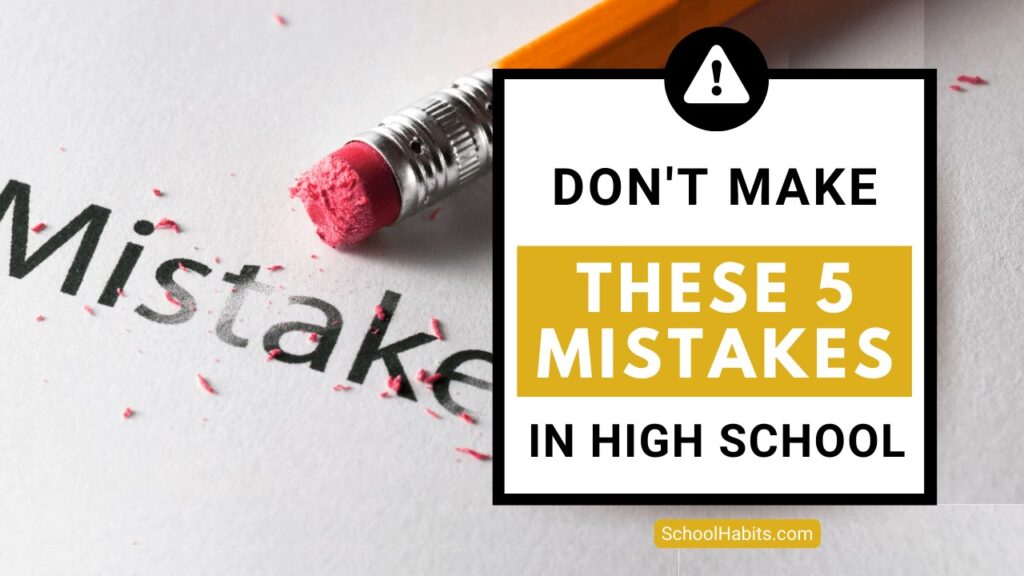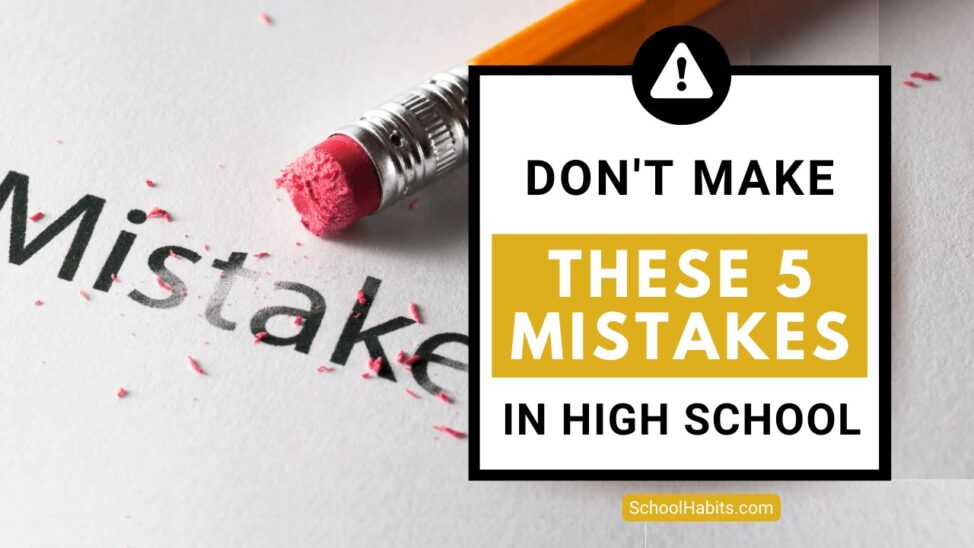
By Katie Azevedo, M.Ed.
I know I sound all teachery-mothery here, but high school is one of the most critical periods of our lives. So much can happen in those four years – good and bad – that can impact the direction we take for our futures. Dramatic? Maybe. Facts? Indeed.
Because high school is so short-term and so high-stakes, it has to be done right. Sure, everyone’s high school experience will look different depending on the bazillion factors that actually make us all different, but still, every student should avoid the following common high school mistakes. Trust me: the rest of your life might depend on it. (Yeah, that one’s dramatic.)
Top 5 high school mistakes
The following 5 mistakes can make your high school experience much harder than it needs to be. Read the following closely. Take it seriously. If you don’t take yourself seriously, no one will.
1. Underestimating how long things take.
Freshmen in high school are often shocked by the difference between middle school and ninth grade. There’s more work, less support, and less time to do it all. A huge mistake that impacts mental health and grades is not getting a grasp on how long it takes to do things. Homework takes time. Reading takes time. Studying for tests takes time. And chances are high that these tasks take far longer than we estimate. High school students must get real about how much time they have in their daily schedule and how long assignments will take to complete; if the numbers don’t match, there’s an issue.
2. Ignoring curriculum planning.
College-bound students with competitive academic goals cannot ignore curriculum planning – starting in ninth grade. Marie Lucca, BA, MTS, JD, President of Crimson College Consulting, advises that “students are sometimes surprised during their senior year when they realize that their dream college requires four years of a foreign language and they’ve taken only two, or 6-8 AP courses when they’ve taken only one.” Lucca, a Harvard graduate with years of experience in the college admission industry, also warns that “sometimes school districts will place an incoming freshman in a particular class, causing ramifications for the next four years. For instance, if a 9th grader is placed in a lower track math class, it may be impossible for that student to take calculus during senior year, a course that many engineering programs and selective universities like to see on a transcript.” In other words, students should reverse engineer their curriculum, starting from where they want to end up.
3. Not learning how to study.
Studying is not reading, re-reading, looking over notes, or flipping through textbook pages. Studying is NONE of these things, yet it’s the way that most high schoolers have been taught to “study.” Therefore, this is common high school mistake #3.
Real studying must involve active recall and spaced repetition. If you’re not using these two study methods, you’re not studying. Hint: real studying is actually mentally uncomfortable. If you’re just chillin’ and feeling good, you’re not doing it right. Here is my complete collection of all my study resources. Also, are you making cheat sheets? You should be.
4. Caring about the grade, and not the content.
Another common high school mistake is caring about the grade and not about learning the thing being taught. Sure, “A”s look good on the report card and make grandma proud, and sure, there are cheap ways to get an A on some assignments by working the system – but believe it or not, learning the thing is easier in the long run. I want to shout this so loudly: taking the time to LEARN and understand the material will ensure that you’ll succeed on all tests and assignments about that material. On the other hand, if you only care about getting an A on an assignment, you’re not learning the material and therefore will be screwed on all future tests and assignments about that material. Short cuts don’t work here, folks – not in high school.
5. Not understanding how FOCUS works.
The ability to focus is a rare skill in today’s world. We are constantly being interrupted by notifications, urgent whatevers, and chemically motivated urges to check our phones. No wonder it’s so hard for students to read more than 90 seconds of The Great Gatsby before zoning out. So what’s the mistake students are making? Not understanding that FOCUS is a SKILL, and all skills can be improved. We can improve our focus if we want to (you should want to) with incremental focus training. Without the ability to focus, we can’t do things that matter. We can’t pay attention. We can’t tolerate boredom. We can’t write. We can’t read. We can’t learn.
If you’re unable to sustain attention in class or stay focused while reading and studying, you need to 1) start being self-aware enough to know you’ve lost focus, and 2) do something about it. Here are the two reasons why most people can’t focus, and what you can do about it.
If you have ADHD: Your brain’s attention centers are wired differently, which makes it difficult for you to determine which stimuli to focus on (because you notice so much at once!). ADHD makes it harder to concentrate on the right things, but that just means you have to use the right strategies to make it happen.
Now that you know to avoid these 5 high school mistakes, these are the top 5 school habits you should be doing. Also, if you often get stuck because you don’t know how to figure things out, here are my top 5 tips for how to figure things out. It’s a good one – read it.

